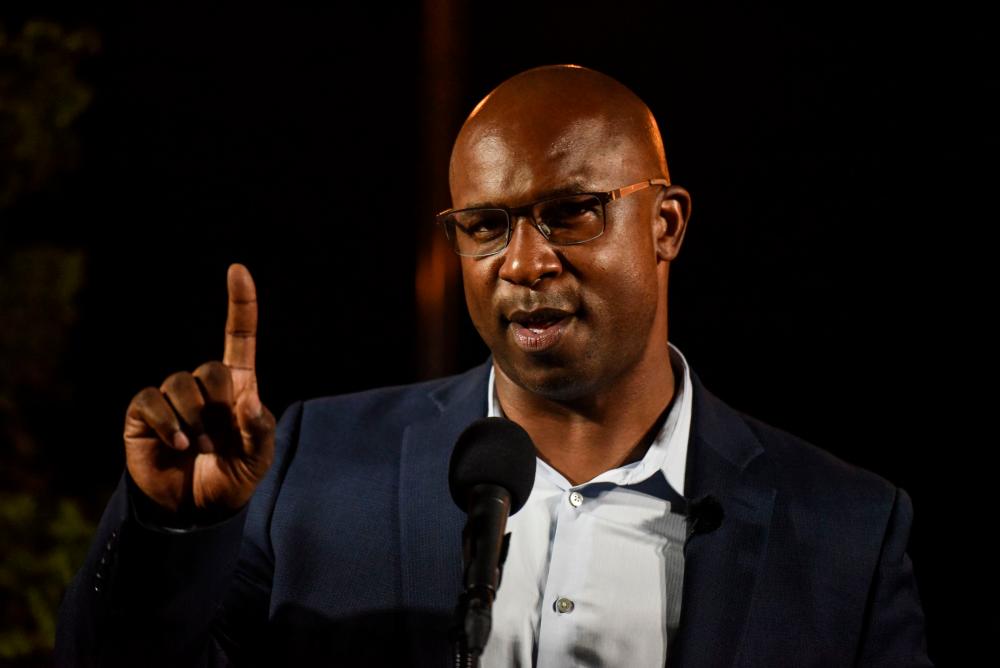NEW YORK: Energized by the US’s massive anti-racism protests, history-making progressives from New York - young, black, Latino and gay - want to shake up Congress’s status quo when they are likely elected in November.
Mondaire Jones, 33, and Afro-Latino Ritchie Torres, 32, are set to become the first black, openly gay members of the House of Representatives following the November 3 vote.
Galvanized by the Black Lives Matter demonstrations, they recently won primaries to become the Democratic Party’s candidates in districts that overwhelmingly vote Democrat, all but securing their election to Congress’s lower house.
Although they recognize the significance of the moment, they say they aren’t going to be content with just being the first, and aim to engineer real change.
“I am not running for Congress to make history as the first openly gay black,“ Jones told AFP.
“But it is not lost on me the power of representation. Growing up, I never imagined that someone like me came to run for Congress, let alone win, because it had never happened before,“ he added.
The pair will be joined by 44-year-old Jamaal Bowman, who is black. He is a school principal and has three children with his wife.
Bowman stunned 16-term veteran Eliot Engel in the June primaries despite the 73-year-old being backed by the Democratic Party’s elite, including Hillary Clinton and House leader Nancy Pelosi.
The trio’s victory proved that the surprise election of Alexandria Ocasio-Cortez to Congress in 2018 when she was in her late 20s was no one-off. She stunned the party establishment by taking the seat from a Democrat who had been in the House for 20 years.
“It’s a victory for the new left,“ said David Barker, an expert on government at American University in Washington.
“The more overtly socialist wing of the Democratic Party did not really used to exist at all until not that long ago and now is a major force,“ he told AFP.
The presumptive congressmen are part of a wave of New York politicians belonging to the progressive wing of the Democratic Party who are unseating veteran, mostly white, legislators.
Fans of senators Bernie Sanders and Elizabeth Warren, these men want to shake up their party and push it further to the left.
President Donald Trump is using their ascendency to score his own political points, arguing the Democratic Party is becoming controlled by “a radical left.”
He has said the Republican Party will beat “Marxists, anarchists, and agitators” during his re-election bid.
Coronavirus
Mass protests following the killing of George Floyd in police custody in May and the racial and economic disparities highlighted by the coronavirus pandemic helped spur the New York trio’s candidacies.
Torres will represent an area of the Bronx that is one of the poorest in the country.
Jones won in an overwhelmingly white district where only ten percent of the population is black.
“We are undergoing a shift within the Democratic Party: new voices, diverse voices that bring a sense of urgency about the climate crisis, about the health care crisis, about the housing crisis,“ said Jones.
They have pitched themselves as champions of the poor and universal healthcare. Forty million Americans lost jobs due to the Covid-19 crisis, which has killed blacks and Latinos in disproportionately large numbers.
Jones was brought up in poverty by his grandparents in the New York suburbs. He studied at Stanford University and then Harvard Law School before working in the US Justice Department during Barack Obama’s presidency.
He suggests some of the old guard have not done enough and must “be replaced by people who understand what’s at stake, especially under the presidency of Donald Trump.”
In addition to championing racial justice, Jones and Torres pledge to fight for LGBTQ rights.
“Their voices are going to make a tremendous difference,“ said Elliot Imse of the LGBTQ Victory Institute, which helps LGBTQ people win elected office in the United States.
Barker - the politics expert - notes that Democratic representation in Congress has become much more diverse with regards to gender, race and religion, in recent years.
“But the opposite has been true with respect to Republicans,“ which is getting more male, more white, and more Christian, he said.
Currently, only two of the US Senate’s 100 members and seven of the House’s 435 representatives identify themselves as LGBTQ.
Although the LGBTQ community comprises 4.5 percent of America’s population, members occupy only 0.17 percent of elected roles, according to the Victory Institute.
“We certainly have a long way to go,“ Imse told AFP. — AFP














